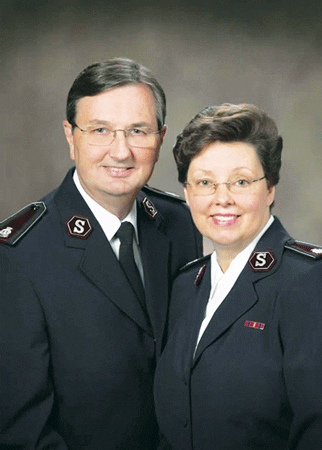by Robert Docter –
So what does get “saved” by this Salvation Army?
I think that’s a question many Americans would ask if they were interested. I suspect most of them don’t really know–and sometimes I wonder how much we want to tell them.
I think some people think we’re in the junk business. Their junk. (And why didn’t that truck get there on the day and hour requested?) People are pretty sure we’re in the–shoe store business–or second hand clothing store business–or used furniture business–or–what do they call it — They also have a feeling we help people. All of these things are true, but is that what we’re “saving” in this Salvation Army?
I note in the annual report that we operate more thrift stores than corps. I also note in that report that while we talk about “group meeting attendance” we don’t make it clear what kind of “Sunday meetings” the attendees are attending–church, I think. Neither do we report on the number of conversions during the meetings.
People just don’t seem to know we’re a church. You want to know why? Because the people who go to the Army’s churches don’t tell them.
It’s very easy to assume that our churches will fill up with people as if by magic–or that the sign on the hall (the word “church” not present on it) will bring them in–or that some wonderful media campaign will attract hundreds of new worshippers.
It doesn’t happen that way! Churches just don’t grow like that.
What builds churches is something within people committed to that particular fellowship. It’s something they perceive as so beneficial that they want to share it with others. I think that something is a sense of God’s presence within the service–within the congregation–within the spoken word and presentation of the Gospel–within the music. I also think that the style of the presentation of that something is classy enough–smooth enough–effective enough to compete with anything seen on channel 4.
So, when the Army church doesn’t fill up, some blame the preacher. Why not! He/She’s vulnerable and no stranger to getting blamed for virtually everything. This person might not be God’s gift to a pulpit ministry–and he’s busier than a one-armed paperhanger during the week–and he’s probably used to feeling guilty. So, go ahead, blame him/her. They’ll be out of here next June anyway.
The preacher does need to be effective–and she does need to be a pastor–among 97 other things–and she does need to be committed to the church program. Now, commitment requires exclusivity–a singular focus, reciprocity–receiving as much as is given, and longevity–a lengthy, lifetime association. I don’t think the Army system can provide any of the above essential attributes of “commitment.” Maybe we ought to work on this.
So what does get saved in this Salvation Army?
Maybe we are in the “junk” business. Homeless people, hungry people, hurting people, addicted people often feel like they are worthless. Even wealthy people come to this conclusion once in awhile. We work to restore those people to a sense of self-worth, an awareness of their own human dignity, to a fellowship with others–and we do it by challenging them to perceive their present darkness and choosing to walk into the light.
They commit to Christ. They fine-tune their souls. They change from the inside out. And what’s amazing is how visible the change is when it comes from that direction–inside-out. Even the posture changes–the facial expressions–the speech patterns–the attitudes–the behavioral choices. The change is so fundamental it’s almost miraculous–come to think of it–it is.
Yes–I guess we’re in the shoe store business as we repair “heels” and re-soul humans.
We’re not like any other church. Why try to be something we’re not? Let’s just be the very best we can be–because what this Salvation Army wants to save are souls.












